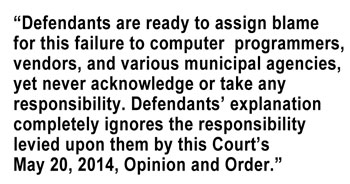A decision handed down by federal district judge Lawrence Zatkoff on May 20 had an immediate impact on Ann Arbor city elections: Bob Dascola’s name will now appear on the Ward 3 city council Democratic primary ballot, alongside those of Julie Grand and Samuel McMullen.

What, if any, durational requirements should there be on elected officials? It’s time for the city council to take a step towards establishing legally enforceable eligibility requirements for elected officials.
Even though the immediate issue appears to be resolved, a longer-term question is still open. That’s because the result of the federal court ruling is that the city of Ann Arbor has no legally enforceable eligibility requirements for service as mayor or city councilmember.
Anyone at all is now eligible to serve – even youngsters under 18 years old, who would not even be allowed to vote for themselves in the election – just as long as they submit the minimum number of signatures on nominating petitions.
So it’s time for the council to put a charter amendment on a future ballot that would establish some sort of eligibility requirements for elected officials. The council has a choice about what kind of requirements to put on that ballot for voters to decide.
In broad strokes, I think the eligibility requirements for elected officials should pose only a minimal barrier to the ballot. It would be perfectly adequate if the requirement were something like the following: To be an eligible elected official, a person must be a registered voter in the geographic area the person seeks to represent, from the time that person files their paperwork to qualify as a candidate.
Before making a case that this is a perfectly reasonable and adequate requirement, it’s worth considering how we arrived at a place where the city now has no legally enforceable eligibility requirements for elected officials. [Full Story]





